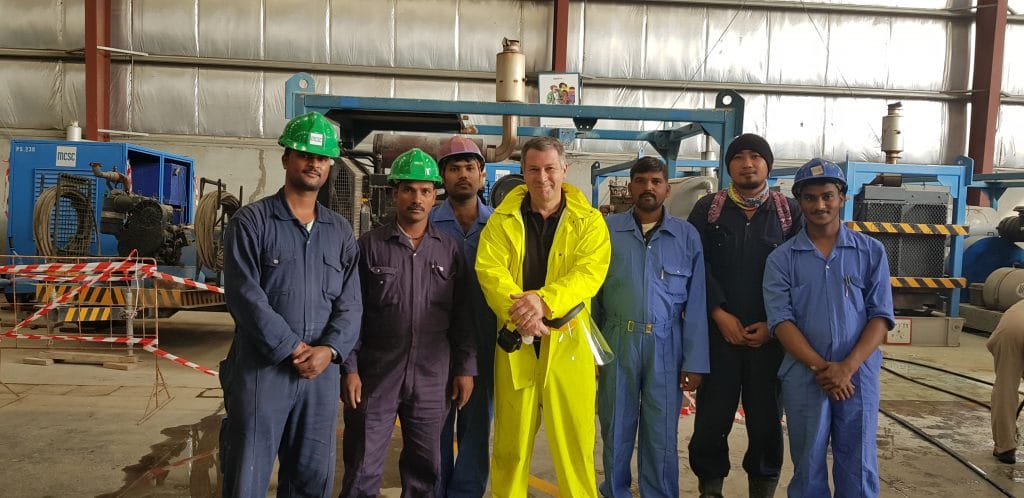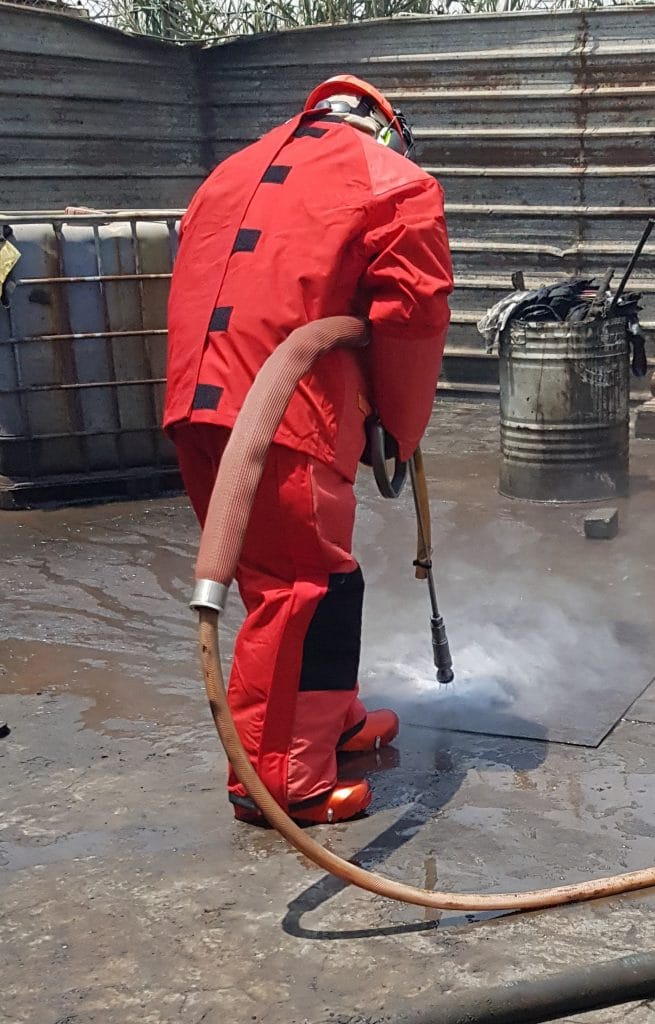Switch on to water jetting training – lessons from the pandemic

Steve Williams leading an online training course – the success of the WJA’s practical modules when delivered online was a ‘revelation’, he says.
Delivering Water Jetting Association training during the COVID-19 pandemic has been a challenge and a revelation, says WJA Training Instructor Steve Williams, from StoneAge Europe Ltd.
Here, Steve, a member of the WJA’s Training and Safety Committee and Ruling Council, gives his personal view on his experience of virtual training for operatives in the Middle East.
………….
The COVID-19 pandemic had a devastating effect on water jetting training. I’d been a WJA instructor for more than 20 years and had seen nothing like it before.
Our training is carried out face-to-face in classrooms and practical sessions. This gives trainers, like me, the opportunity to share the best knowledge and experience – and show as well as tell.
On top of that, the WJA quite rightly puts a significant emphasis on practical assessment. The health and safety risks demand it. Training rules had just been changed to require new operatives to undergo both the Safety Awareness class-based course AND at least one practical module (out of four options) to obtain their WJA certification.
An acute problem
All of sudden, when COVID-19 hit, neither class-based or practical training was allowed. People could not gatherin training rooms or even outside for the practical training and assessment.
For the many overseas clients I have, mainly in the Middle East, this problem was particularly acute, not least because the pandemic also seriously disrupted air travel.
Most provide high and ultra-high water jetting services to the oil and gas industries. Thanks to the high regard WJA training is held in it has become increasingly important in oil and gas producing states like the United Arab Emirates, Kuwait, and Saudi Arabia.
Their refineries were not going to be shut down by the pandemic. However, they had strict standards that needed to be met and there was no way those standards were going to be relaxed. That meant water jetting training had to continue.
Face-to-face on video
The only option, then, was to explore the possibility of delivering the training remotely online. This prompted a lot of questions and discussion within the WJA.
I had courses booked up for weeks and months in advance. New operatives needed training and experiences ones needed refresher training. Without the WJA certification, contractors would not be allowed on refinery sites. It was as simple as that.
The solution was to conduct training through online webinars. This retained a strong element of face-to-face training. I could still see my trainees and they could see me. We were just several thousand miles apart.
Initially, we created an online version of the Safety Awareness class-based course, and agreed that if trainees passed the required end of course test, their certificate would be valid for the standard three years.

Immediate feedback
We then agreed a way to deliver the WJA practical modules online with a video recorded practical following set guidelines. This would give the trainees an interim one year WJA module certificate until the trainer could visit the client to complete an on-site face-to-face practical session.
The video practical worked better than expected as we had visual evidence of the practical session which allowed immediate and constructive feedback to the trainees.
We decided from the start that webinar class sizes should be no bigger than eight people. This allowed me and the client manager, who acted as my translator, to monitor what was happening and be sure the training delegates were getting a good learning experience.
What helped greatly was the high motivation levels within the class. Operatives in the Middle East value the opportunity to be trained. They understand its importance, not least for them to earn a living, so they are eager to learn.
Nowhere to hide
This meant I could see their attention levels were high. And as anyone who has spent hours in Zoom and Team calls knows, it is harder to switch off in a video meeting, because you are on show at all times. There is nowhere to hide. That applies to the trainer as well!
For the Safety Awareness course, online learning meant long days. A course that might take five hours to deliver in the UK, takes longer in the Middle East, even face-to-face, because of the language barriers.
With training webinars, course times were extended still further as we wanted to make sure key points were understood by everyone.
In general terms, the online Safety Awareness training went very well. Test results at the end of the courses demonstrated key points were being learned, with satisfyingly high scores.
Practical revelation
It was perhaps the way the practical modules translated into an online course that was a revelation for me. How could practical training be delivered a quarter of the way around the world?
In most cases, the training rooms the operatives sat in for the webinars were some way from the places where practical training could be done. Therefore, under the supervision of one of their managers, the operatives were instructed to carry out the practical drills expected of them in the relevant practical module. These were videoed using a mobile phone.
Then the videos, each around five minutes long, were brought back into the training room and sent to me via WhatsApp.
Then, we could go through each operative’s video together as a group. This turned out to be a brilliant way to learn. The sessions become very interactive, with other operatives chipping in ideas about what they were seeing and how best to carry out different tasks.
Like football VAR
It was a little like having our own training video assistant referee training like football (but not so controversial). We could review sections of clips more than once, helping us to reinforce key points as we went along. Arguably, this process presented a richer education experience. The video also gave each operative evidence of the practical session that could be reviewed and reflected on later.
No one switched off. They all wanted to see how each other did. And many were happy to comment and share their views. This was aided by the fact that, like most people now, water jetting operatives in the Middle East gain most of their news and entertainment from online video.
It was my job to keep the sessions positive and focused on developing everyone’s insights.
If necessary, I could ask an operative to do more practical training and send me the video to assess areas of improvement before issuing a certificate.

Standards maintained
I was genuinely surprised at how well both the WJA Safety Awareness and Practical Module could be managed remotely. This is a personal opinion, but I think it has presented very useful lessons for future development of WJA training.
It has demonstrated that standards can be maintained with online learning. This was helped by having motivated operatives who were willing to learn, and an experienced trainer who understands the technical and cultural factors at play.
In my view, it has shown that conducting practical training online actually has some advantages that has the potential to enrich the learning experience. This might be carried out as part of a blended training approach, combining online and face-to-face techniques, in particular where distances between trainer and trainees are significant.
This has important implications. The emphasis of WJA training rightly remains focused on face-to-face learning. Now the COVID-19 pandemic is waning, that emphasis will continue, for good reason. Learning from an expert standing in front of you has big advantages that will not go away.
Sustainable training
However, I believe we’ve demonstrated that online training can also work. As companies seek to reduce their carbon footprints, and are required to by governments, why would they not want to control the amount of air travel associated with essential training?
And, as the WJA’s reputation grows internationally, why shouldn’t more water jetting contractors and service users in other regions of the world benefit from sustainable and cost-effective training?
These are questions for the future. But, as I have mentioned, a blended approach to learning could be one way forward.
As we have seen, the COVID-19 pandemic has accelerated change in many areas of business. Creating challenges and opportunities. Based on my experience, I think those challenges and opportunities include the way water jetting skills are shared around the world.
Need water jetting training?
Find out more today about water jetting training from the WJA. Call +44 (0) 208 320 1090. Email info@waterjetting.co.uk.
